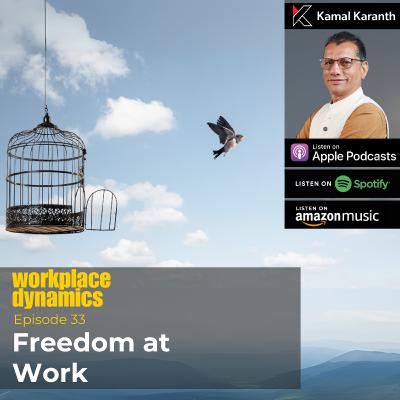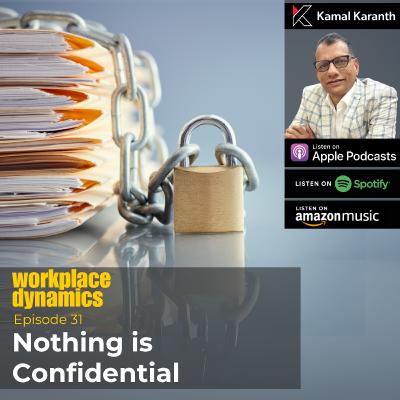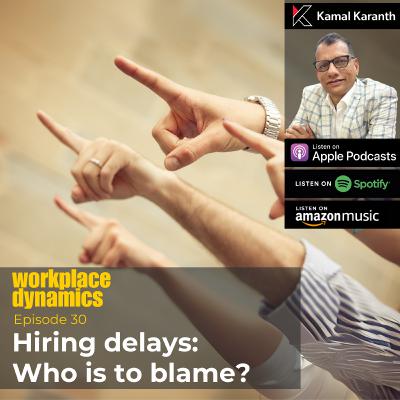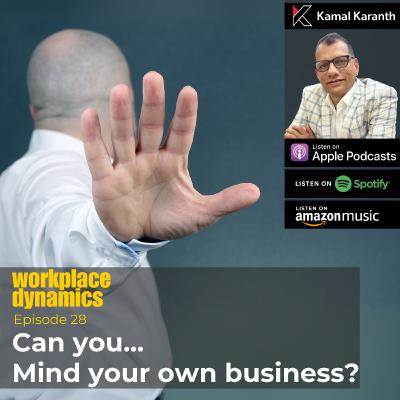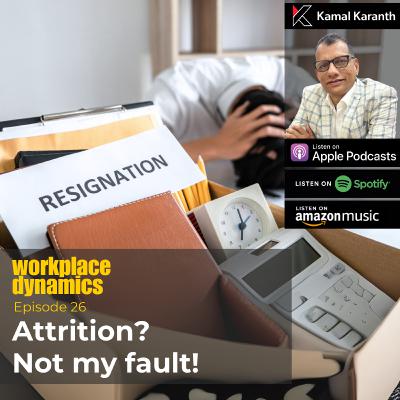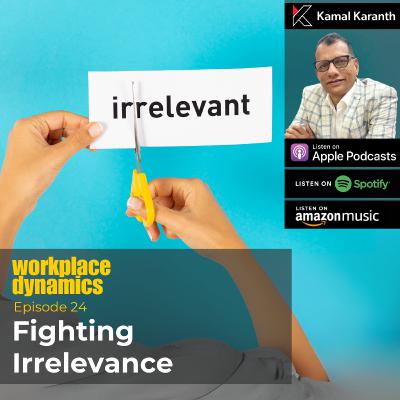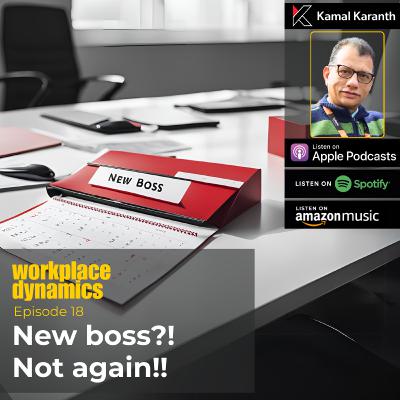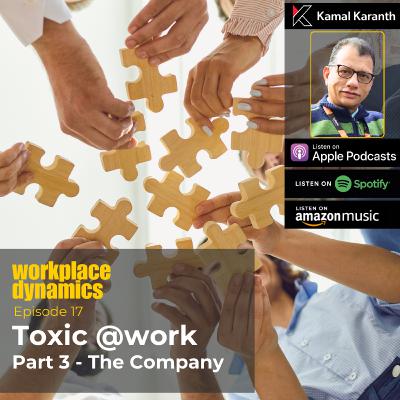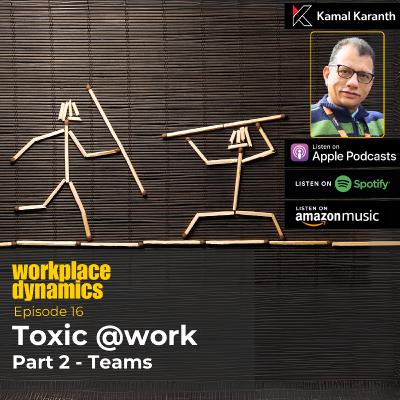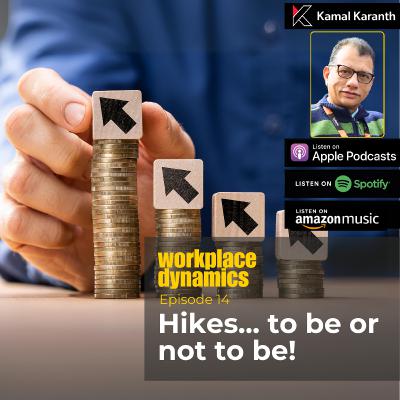Discover Workplace Dynamics with Kamal Karanth
Workplace Dynamics with Kamal Karanth

Workplace Dynamics with Kamal Karanth
Author: Kamal Karanth | Co-founder, Xpheno
Subscribed: 1Played: 1Subscribe
Share
© Kamal Karanth | Co-founder, Xpheno
Description
Weekly podcasts from Kamal Karanth, Co-founder of Xpheno. Join in and listen to Kamal dissecting the interesting and intriguing dynamics of workplaces all of us are part of in one way or the other.
33 Episodes
Reverse
What motivates you the most at work? Is it Money? Affiliation? Achievement or Power? If it's Affiliation and Connection... what are you more connected to...? The Enterprise or Brand? Your Manager? Your team or peer group? Or your role?
What's your definition of Freedom at the workplace? Choice of work time, space, location, colleagues, bosses, tasks... and beyond.
Are company dinners with bosses and colleagues the time to connect with them or enjoy the meal? Are there official DOs and DONTs for informal lunch or dinner meetings with super bosses and colleagues? Should HRs also set out guidelines for the same?
If you know your colleague's salary and use it, is it a breach of confidentiality terms signed with your employer? What do you do if you get to know your colleague's salary or increment percentage or bonus amount? How can we get caught up with others' pay information?
A top reason for candidates dropping out of a recruitment funnel is the time taken for the hiring process. Is it the system or the process of meeting multiple candidates or unusually high number of rounds or something? Irrespective of the technicalities, isnt it the Hiring Manager who is to be blamed for inordinate delays causing candidates to dropout? Can Hiring Managers step forward and own up the control they have in the velocity of a hiring process?
If you send an acknowledgment note to an interviewer, after your interaction... would that look like desperation or seen as someone who takes the initiative or being participative? Has the lack of participation in enterprise initiatives become a common occurence? If yes, why so? Why dont we participate in events, ritual and processes of the enterprise? Why and when do we give things a cold shoulder in the work context? Is there a hack for genuine participation versus the tick-in-the-box participation?
What do you do if your peer or counterpart is out of line? Do you let it pass or confront them? What's the forum of expressions of our views or opinions against our peers? Take it up with the boss or share with peers or in a public forum or a one-to-one setup? Is one-to-one the most potent or challenging setting? With no authority over peers does this become complicated?
Have you complained to your super bosses, about your immediate boss? What are the consequences of taking on the bosses? Did you have the resilience to handle the consequences of taking on your boss head-on?
Can performance be the shield... always? Without performance can one get away with just logical arguments? How can one balance standing up for oneself versus switching jobs eternally?
Have you heard of leaders being let go because they had high attrition in their team? What matters... is it WHO left or HOW MANY left? If performing leaders have high attrition, would you punish them? Is there a balance between high performance and talent retention? Is it prudent to look away, if high attrition teams are also the best performing ones?
How safe should one feel at workplaces, especially when it comes to being candid with your colleagues? Is hyper-caution increasingly needed in a highly digitally intruded space? Is it a thin line between the within and without of the organization? How safe is your internal townhall video from being posted on a public social media platform? Are we heading towards paranoid organizations asking employees to leave phones outside the meeting room? Don't be surprised... as walls dont just have ears, but also eyes now.
If you are not the top performer this year, what would you do? Play victim, quit or fight back? Have you experienced lean patches of performance and the connected feeling of irrelevance at work? What did the organization do to make you or your team feel irrelevant? How did you or would you fight the situation?
Do you want to work with larger than life promoters, but dont want the downside of working with the eccentric or scrappy side of them? Have you worked with founders or leaders with the unique balance of being classy when they have to be and agile enough to switch to be scrappy without feeling uncomfortable about it? I've seen this unique trait mostly among promoters... do you think otherwise? If you answered yes to any of the questions, this episode is for you!
How many things have you learnt at work by getting a rap on the knuckle? Were you reprimanded at work for some instinctive behaviour of yours?
Have you tried texting your boss at 11a.m saying you took an unplanned leave? If yes... how was your boss' response the next time you wanted a leave?
Workplaces have many unsaid things that college didnt teach us. What are these various unsaid nuances of organisations or industry or roles that you need to work with?
Can every single nuance be put on a policy? On the other hand, can enterprises wait it out for situations or outages to arise where a particular nuance is declared in the open?
Have you ever told anyone they weren't as good as they used to be? ...Or... if you are unable to do certain things you seamlessly did in the past, what does it tell about you?
When do you know you've lost touch? Or your reportee or boss has lost that skill or touch? Is it performance, feedback from colleagues or showing up with zeal & energy?
When was the last time you genuinely felt you've lost touch? And if you did... check out this episode on the context of feeling irrelevant.
Do you struggle with some of your team members who don't scale up? Do you constantly wonder if they fit in? Can you spot your reportees who have great intent? Join in as we look at some of our reportees who are capable but dont intent, and vice versa.
Is your organization asking you to report to a new boss every year? Is it because they like to change or because the bosses don't stay? If your answer is YES... this episode is for you.
Do you work hard without feeling tired or checking your watch, does it mean you are enjoying work? What kind of policies, practices or functions create stressful workplaces? Or is it on the leaders and context of the organization that make its working toxic and stress inducing?
Catch up... the closing part of the trilogy on toxic workplaces.
Is it easy to determine if you are surrounded by a toxic team? How do toxic teams look like? Is there a team that you dreaded working with in the past? This episode is not to bring back memories of some not so good past... but to share my experiences with team level toxicities and discuss if there are signs to spot a toxic team?
If you've been blessed to work at great companies with inspirational bosses and teams with great vibes... this episode is not for you! In this 3 part series, this one is about Bosses... yes the ones that stress us out with their toxic ways!
Is your current salary directly propotional to the number of job changes you've had? How many times have you quit as the new employer accelerated your CTC by a few years? Have you been a rolling stone to reach your current compensation? Are you at below market level salary because you stayed too long on a job?
Listen on...



